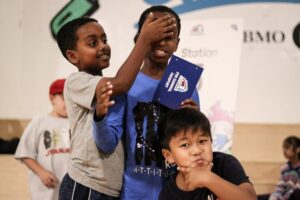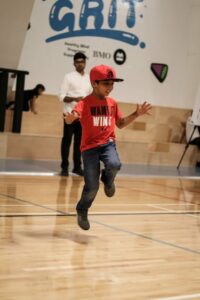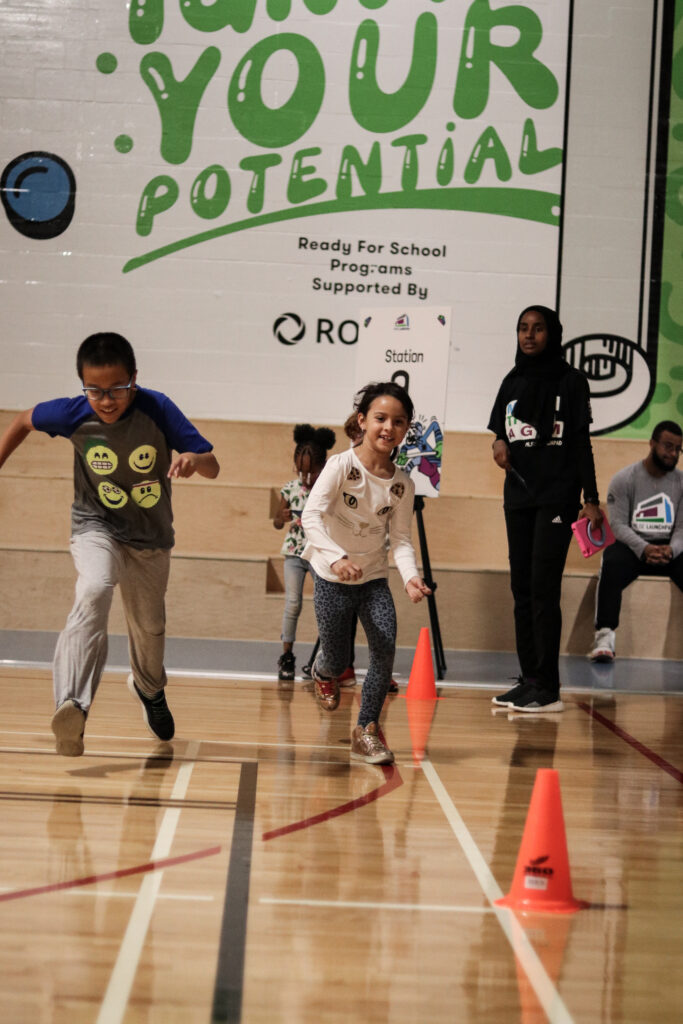The loosening of COVID‑19 pandemic restrictions on sport and physical activity presents a unique opportunity to dramatically change how we engage young people in sport and physical activity. Pre-pandemic sport participation was marred by high dropout rates among girls and young women, youth from low-income households, and teenagers in general.
Recent reports suggest that this dropout problem persists and may be worsened by the pandemic: Canadian Women & Sport’s COVID Alert Report suggests that as many 1 in 4 girls and young women do not plan to return to sport. Meanwhile, MLSE Foundation’s Change the Game Research Report found that a third of girls were less interested in sports in 2021 compared to pre-pandemic.
What can we do to change this trajectory to keep youth engaged long-term? This question requires a multi-part solution. One of those parts is to address long-term engagement by placing greater focus on opportunities that intentionally build physical literacy.
Physical literacy is “the confidence, competence, knowledge and motivation to value and take responsibility for engagement in physical activity for life.” Physical literacy doesn’t have the same collective recognition that reading, financial, or digital literacy do. Yet, it deserves its moment in the sun.
 At MLSE LaunchPad and Canada’s National Ballet School (NBS), physical literacy is an essential component of programming for people of all ages, from as young as age 6 well into adulthood. Recently we talked with MLSE LaunchPad and NBS staff about the importance of physical literacy and why it should be a bigger focus in the way we return to sport. Each contributor brought a unique perspective to the conversation, from research to coaching to movement outside of traditional sport settings. Contributors include:
At MLSE LaunchPad and Canada’s National Ballet School (NBS), physical literacy is an essential component of programming for people of all ages, from as young as age 6 well into adulthood. Recently we talked with MLSE LaunchPad and NBS staff about the importance of physical literacy and why it should be a bigger focus in the way we return to sport. Each contributor brought a unique perspective to the conversation, from research to coaching to movement outside of traditional sport settings. Contributors include:
- Kwame Otchere (KO), Sport Program Lead, MLSE LaunchPad
- Jackie Robinson (JR), Coordinator, Research and Evaluation, MLSE LaunchPad
- Marika Warner (MW), Director, Research and Evaluation, MLSE Foundation and MLSE LaunchPad
- Ashleigh Powell (AP), Artistic Faculty and Head of Community Dance Programs, Canada’s NBS
The summary is adapted from a larger discussion. To find out all that was shared in that discussion, access The Power of Physical Literacy podcast.
It can be hard to translate the textbook definition of physical literacy into a real-world context. What does physical literacy mean from your perspective?
JR: Physical literacy means you have that motivation and that confidence in movement. You want to move and have the physical ability to move.
KO: Physical literacy is the foundation we set for engaging in sport. At MLSE LaunchPad, we build fundamental movement skills (like hopping, skipping, and jumping) through fun, and these become the building blocks of any physical activity you might want to do later in life.
AP: Physical literacy is about our journey [toward] being physical at many different ages and stages, different kinds of abilities, and that we all have the right to learn through and within movement. It’s the agency that our body has. It’s the way we learn. It’s often the way we communicate.
Why is physical literacy important?
 AP: As we’re using fundamental movement skills to scaffold people’s learning, we’re giving them successes along the journey so that there’s that opportunity to feel like you accomplished something, you learned something. And, if you move from accomplishment to accomplishment, you can build that capacity. And I think that connects to people’s self-image, self-concept, self-efficacy, because those little wins along the way are what develop[s] and sustain[s] that motivation. There’s so much that we can offer to young people by giving them that confidence early.
AP: As we’re using fundamental movement skills to scaffold people’s learning, we’re giving them successes along the journey so that there’s that opportunity to feel like you accomplished something, you learned something. And, if you move from accomplishment to accomplishment, you can build that capacity. And I think that connects to people’s self-image, self-concept, self-efficacy, because those little wins along the way are what develop[s] and sustain[s] that motivation. There’s so much that we can offer to young people by giving them that confidence early.
KO: I see that as a coach. We have a lot of youth who are really motivated to build their skills, and we want to help them sustain that motivation. Bringing the fun as they progress keeps them coming back. We want youth to have opportunities to be active outside a set structure.
JR: The importance of physical literacy comes down to engagement in physical activity. Youth [who] engage in sport are more likely to graduate from high school, are more likely to achieve employment. Physical literacy is not just when I’m in basketball, physical literacy is life. Make it fun to find those things like hopscotch, or when you were a kid and didn’t want to step on the cracks when you were walking the sidewalk. That’s an example of ways you can incorporate those basic fundamental movements that really build into larger competencies down [the] line.
How can physical literacy help us understand why youth play as well as why some stop playing?

AP: Measurement matters. We can make assumptions all the time about why a kid isn’t participating. And when we dig deeper, when we ask hard questions, when we look for evidence to support what we’re doing, I think we become better providers of this kind of opportunity to be physical, whether it’s physical activity, sports, physical literacy, dance, all of it has to be done with integrity and intention. And I think physical literacy provides a framework for that.
KO: Even on the coaching side, I want that feedback. If I’m not doing a good job, what am I doing wrong that’s making this kid not come back or making this kid not have this great experience? It definitely holds all of us accountable, and it keeps us going.
JR: I think physical literacy shifts the blame of youth dropout from youth back onto program providers, sport organizations, coaches, everyone involved in the sport or physical activity [environment]. There’s no denying that youth want to be involved in sport, but there’s something about the system that’s not responsive to them. We’re not giving them the right skills to enjoy movement for long term [and] to want to come back.
Discussion wrap-up
You can help youth rebound from the pandemic’s negative effects. Provide youth with evidence-based sport and physical activity opportunities, specifically ones that intentionally support the development of physical literacy. Focus on activities that are fun, spark creativity in movement and are challenging yet accomplishable. Such activities welcome youth back to the playing field and hold promise for keeping them engaged in the long-term.
Interested in learning more about how physical literacy supports ongoing physical activity in youth? MLSE LaunchPad has released the results of its 2-year longitudinal study, The Power of Physical Literacy. The study explores important relationships between physical literacy and physical activity. MLSE LaunchPad also published a paper detailing a successful physical literacy intervention delivered to 6-year-old to 10-year-old youth. To access the report, the paper and the full conversation (podcast), please visit www.mlsefoundation.org/how-we-give/research.